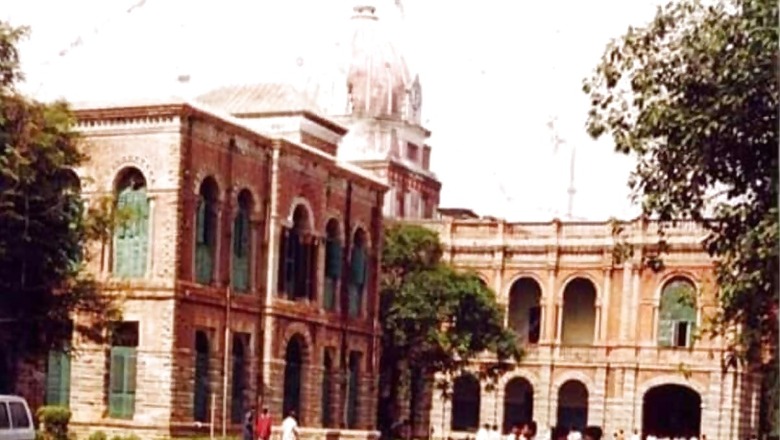
views
Back to Presidency College, Madras. According to the amended rules, the following new academic posts were filled with eminences adorned with the following qualifications:
- A singer of dirges in Sanskrit and Tamil became the Chief Lecturer.
- A “pure” Tamil loyalist had been working as a Hindi Munshi in some school but had lost his job after the Tamil warriors inflicted a crushing blow on Hindi in the state. Now, giving this Sanskrit lectureship at Presidency College was how the Dravidianist government rehabilitated this ex-martyr of ‘Pure’ Tamizh.
- Then there was a former Personal Assistant of a former Dravidianist Member of Parliament. This MP knew no other language than Tamil. This P.A. had rendered him faithful service each time the MP went to Delhi by acting as his translator. Unfortunately, the P.A. lost his job the moment the MP lost his deposit in a recent election. But like his benefactor, he was also a committed Tamil warrior who had passed a Tamil language exam. The ex-MP pressurised the Tamil Nadu government to give his PA the Sanskrit lecturer job.
- The fourth eminence was a self-taught Sanskritist who had learned the language using… psychics. In a previous avatar, he had led a “successful” (read: violent) agitation against the hated Brahmins. The Government gratefully rewarded him now.
All these appointments were filled to the utmost satisfaction of the Dravidianist government. The Sanskrit Department had been suitably upgraded.
It was now time to implement the Second Step of the Great Dravidianist Leap Forward. This was revising the Sanskrit syllabus.
Recall our friendly cop who had done such yeoman service to Sanskrit in Tamil Nadu? He was now back in action with greater gusto as a highly valued member of the syllabus revision committee. After detailed and elaborate deliberations spread over months and involving highly animated and sublime discussions, a unanimous consensus was reached: the existing syllabus was… heavy. It had to be made lighter and… student-friendly. Else, no one would come forward to learn Sanskrit.
Here are some highlights from the revised syllabus:
- Rasagangadhara of Jagannatha Panditaraja. Decision: Delete
- Kavyaprakasha of Mammata. Decision: Delete
- The second half of Kadambari by Banabhatta. Decision: “Retain half of the second half,” recommended the friendly cop.
- The origins of Decision: Delete
- The Panchama-Anka (Fifth Act) of Kalidasa’s Abhijnana Shakuntala. Dr BGL Swamy gives a graphic, first-hand account of this matter. The friendly cop exploded with fury when he heard the name of Panchama-Anka. He thundered, “Beware! I will throw solid punches…I mean, the government will throw into prison anybody who even utters the word, Panchama(another word for “Dalit”)! The member who proposed the Fifth Act clarified patiently, “Panchama-Anka means the Fifth Act.” Friendly cop: “That’s exactly what I’m also saying! The Act, meaning, the law regarding the Panchamas! It is not necessary. We’ll replace it with the First Act. Our young students will be thrilled to read the romantic episodes between Dushyanta and Shakuntala.” Decision: The Fifth Act was replaced by the First Act.
- Decision: Retained after heated debates.
However, not one member of this new teaching faculty had learnt the Vedas in the traditional method. And so the university appointed an intellectual lobbyist of the Dravidian ideology to the position of a Vedic Pandit. He had a smattering of Sanskrit but what really nailed his job was his qualification as a committed patron of the Dravidian ideology.
Accordingly, this luminary was tasked with teaching Vedic recitation to these newly recruited lecturers. After six months of teaching, he realized his own limitations and in a rare flash of honesty, blessed them as follows: “I have knowledge of Vedic recitation enough for reciting the Vedas myself. I haven’t learnt how to teach it. I bless you all to become my Ekalavya disciples and practice Vedic recitation on your own.”
The dutiful disciples followed his path but with a slight modification. One disciple was an accomplished singer of Thevarams (a traditional method of singing Tamil devotional hymns to Shiva). He began chanting the Vedic mantras in the Jenjuti Ragam set to the Rupaka Talam.
The “upgrade” to the Sanskrit Department had predictable consequences. Within two years, the department had more teachers than students who leapt out to safety, far away from this Great Dravidianist Leap Forward.
But the most stinging indictment came from a student who had already come equipped with formidable pre-qualifications. Since childhood, he had learnt Vyakarana (Grammar), Kavya (Poetry), Nataka (Drama), etc, in the traditional method. After attending a few classes in this revolutionary scheme of Dravidian Sanskrit education, he went to his teachers and sought their blessings before bidding them farewell: “My Most Revered Gurus, I have an earnest appeal. Please listen to me with benevolence. If I continue to study here any longer, I will forget what little Sanskrit I have learned so far. I will join another college and continue my Sanskrit studies there. You must kindly bless me and relieve me.”
The flood of Sanskrit enthusiasts that the Great Dravidian Leap Forward had originally anticipated was now reduced to a solitary drop. And then it dried up completely. The government asked the Sanskrit Department to justify the existence of so many Sanskrit teachers without any students. Those teachers who saw the writing on the wall quickly activated their old networks and jumped to greener pastures. A couple of years later, the university issued a general order to upgrade the syllabi of all subjects including Sanskrit.
Except that there were no longer any takers for Sanskrit at Presidency College, Madras.
The author is the founder and chief editor, The Dharma Dispatch. Views expressed in the above piece are personal and solely that of the author. They do not necessarily reflect News18’s views.




















Comments
0 comment